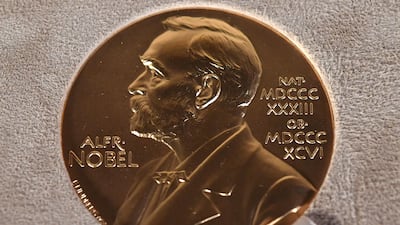The winner of the Nobel Peace Prize will be announced on Friday, with US President Donald Trump often touting himself as deserving of this year's prestigious award.
During a meeting with Israeli Prime Minister Benjamin Netanyahu in February, Mr Trump said: "They will never give me a Nobel Peace Prize. It’s too bad. I deserve it but they will never give it to me."
Mr Netanyahu later nominated Mr Trump for the prize. The US President has also been nominated by the head of Pakistan's army, Cambodia's Prime Minister and a Republican congressman. He has been nominated before by people inside and outside the US.
Norwegian media, citing anonymous sources, reported in August that Mr Trump had called Norway's Finance Minister to discuss the Nobel prize. Members of the Nobel committee are chosen from the Norwegian Parliament.
"Everyone says that I should get the Nobel Peace Prize," he told the UN General Assembly last month.
How does Nobel committee choose a winner?
The Norwegian Nobel Committee is responsible for the selection of eligible candidates and the choice of the Nobel Peace Prize laureates.
The committee comprises five members appointed by the Norwegian parliament and the prize is awarded in Oslo.
Anyone can be nominated, though candidacy must come from a "qualified nominator", such as university professors, politicians or former recipients.
Submissions must be made before February 1. Committee members review the submissions – this year there were a record 338 individuals and organisations up for consideration – and draw up a shortlist, after which members engage in a "thoroughgoing discussion" of candidates. The laureates are chosen in early October by majority vote, with winners receiving their prizes in December.
Why does Trump say he deserves the prize?
Mr Trump claims to have stopped seven wars since coming into office: the Israel-Iran air war, the India-Pakistan flare-up over Kashmir, resolving tension between Egypt and Ethiopia, border violence between Cambodia and Thailand, the Armenia-Azerbaijan war, the establishment of economic ties between Kosovo and Serbia, and the conflict between Rwanda and the Democratic Republic of the Congo.
The claim is dubious, however, as several of the countries on the list were not actually at war. In others, fighting has continued despite peace accords.
He has also been heavily involved in trying to bring an end to the Russia-Ukraine war, which he vowed to end within 24 hours, and the Israel-Gaza conflict.
The President has also said his brokering of the Abraham Accords in his first term is worthy of the Nobel Peace Prize.
Could Trump win this year?
Despite Mr Trump's less-than-subtle nudges, he is not a viable candidate to win this year.
The nomination deadline was only 11 days after he took office, though the peace prize committee does accept late nominations until the first meeting after the deadline.
He might be on the list for next year but several things are working against him.
The committee typically focuses on the durability of peace, the promotion of international fraternity and the quiet work of institutions that strengthen those goals, PBS reported, citing Nobel experts.
The committee focuses more on long-term, multilateral efforts over quick diplomatic wins. While Mr Trump has touted several diplomatic successes, he has not solved the root causes of many of the conflicts he has claimed to stop: India and Pakistan have been at odds since their respective foundations, Israel and Iran are still mortal enemies, and fighting is still raging in Democratic Republic of Congo's Kivu region and other places.
A nomination for the Abraham Accords might have helped Mr Trump over the line, were it not for regional countries, including the UAE, telling Israel the accords and their potential expansion were in danger due to its actions in Gaza.
Also working against him is his pursuit of what critics call regressive policies in areas such as health, education and the environment.
And, though declaring when he re-entered office that he would be a "peacemaker", he has since renamed the Department of Defence the Department of War.


